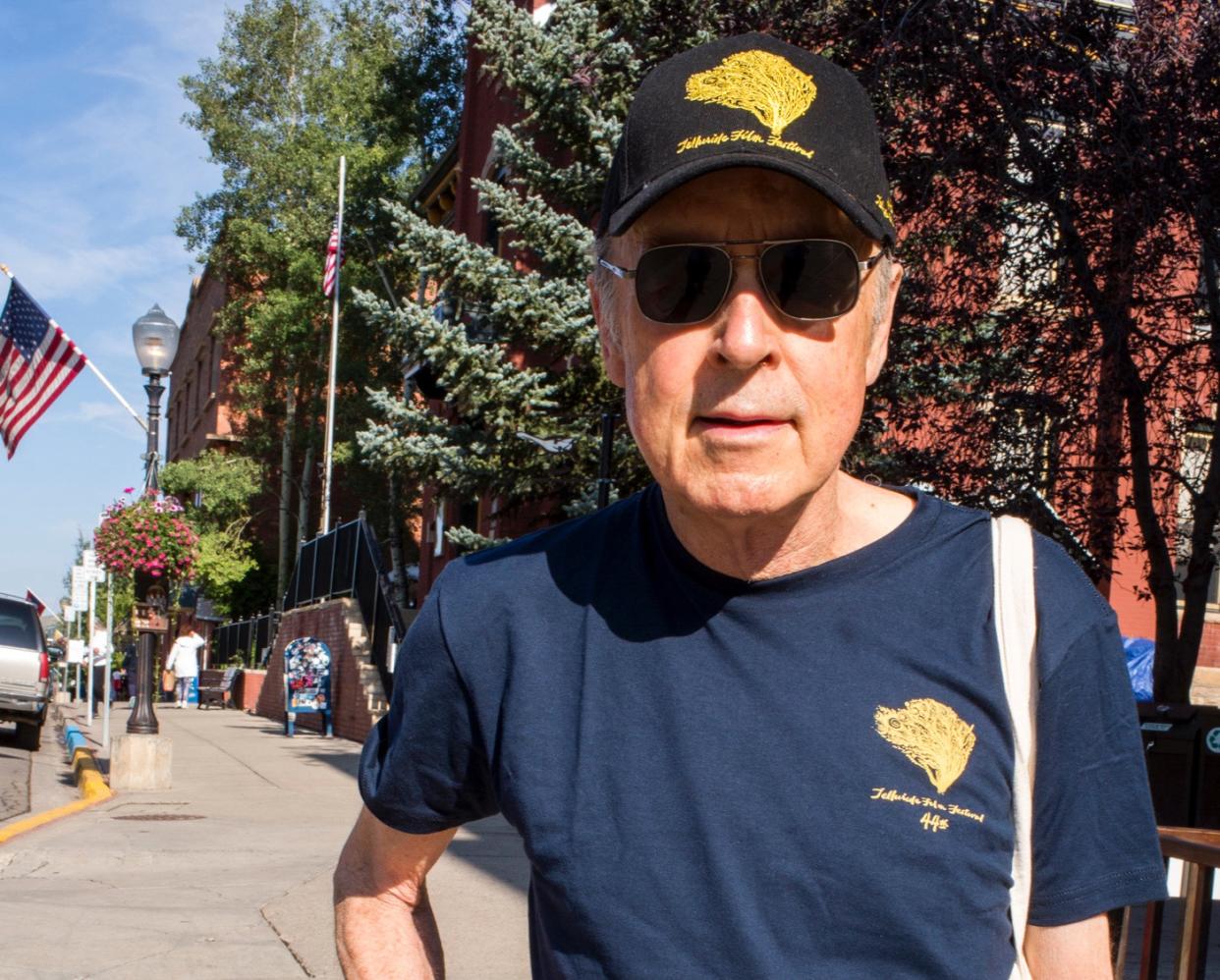Telluride Co-Founder and Francis Ford Coppola Producer Tom Luddy Dies

- Oops!Something went wrong.Please try again later.
- Oops!Something went wrong.Please try again later.
- Oops!Something went wrong.Please try again later.
Tom Luddy, the co-founder of the Telluride Film Festival and a longtime producer for Francis Ford Coppola’s Zoetrope Studios, died on Monday after a prolonged illness. He was 79.
His death comes on the verge of the festival’s 50th anniversary, as Telluride planned to salute the man responsible for establishing the Colorado gathering as a critical launchpad for international cinema. Luddy was shrewd cinephile with a daunting grasp of film history that informed his sharp opinions about the medium, much of which played a role in the unique nature of the Telluride community.
More from IndieWire
Raquel Welch Dead at 82: Actress Was a Symbol of the Liberated '60s
12 Must-See Movies from the 2023 Berlin Film Festival, from Christian Petzold to Reality Winner
The festival drew crowds of major directors and industry insiders in tandem with amateur movie lovers attracted to the same welcoming environment he created for anyone who shared his passion for the movies. For many Telluride devotees, Luddy was its biggest draw — someone as emblematic of cinema’s global presence as the directors he championed.
As a critical figure in the cultivation of an audience for international cinema in the U.S., Luddy’s impact on the country’s relationship to cinema is immeasurable. Over the years, his relationship with filmmakers such as Werner Herzog, Wim Wenders, Errol Morris, Coppola, Paul Schrader, Agnieszka Holland and many others helped establish Telluride as a singular launchpad for major directorial talent.
As part of Luddy’s expansive network, their continued presence at the festival over the years contributed to the festival’s unique identity as an exclusive environment for influential figures of the film world to keep tabs on contemporary cinema and new restorations. That appeal cemented the foundation for the festival’s eventual currency during Oscar season, as the Labor Day weekend gathering eventually became a critical stop for awards season hopefuls.
Born in New York City in 1943, Luddy was a golf champion in college who later discovered his passion for film in the 1960s counterculture of the Bay Area while attending UC Berkeley. As a student, he headed the F.W. Murnau Film Society, the Slate Film Society, and the Student Union Film Series. In 1964 he worked as the assistant to Ed Landberg at the Berkeley Cinema Guild.
When he graduated, Luddy served as the head of distribution for Brandon Films, where he worked on the release of Pier Paolo Pasolini’s “Accatone” and Alain Resnais’ “La Guerre Eat Fini.” He then took over the Telegraph Repertory Cinema in Berkeley as its program director, and eventually took over the Pacific Film Archive in 1972, where he soon was organizing close to 1,000 programs each year. Styling himself on French cinematheque pioneer Henri Langlois, Luddy played a critical role in the restoration of major retrospectives for auteurs such as Roberto Rossellini, Douglas Sirk, and Akira Kurosawa, ensuring their significance would make its way to the U.S. Among the most significant of his programs was a comprehensive 1968 retrospective of Jean-Luc Godard’s work that broadened awareness of his work in America.
Luddy’s programming also helped young Bay Area peers Coppola and George Lucas deepen their world cinema knowledge just as they embarked on making significant American movies inspired by those same directors. At Telluride, Luddy’s most famous restoration coup was the original cut of Abel Gance’s silent classic “Napoleon.”
Together with Bill and Stella Pence and James Card, Tom co-founded the Telluride Film Festival in 1974. The first edition was held in the small opera house, where screenings still take place, though it quickly expanded around town.
Meanwhile, Luddy’s programming instincts were informed by his day job. At Zoetrope, he acquired and distributed films from around the world, including the classic Chinese films “The Spring River Flows East,” “Crossroads,” and “Street Angel.” His work as a producer is on par with his curatorial work. His credits include Jean-Luc Godard’s 1980 narrative comeback “Every Man For Himself” and 1982’s “Passion,” as well as Schrader’s revered “Mishima: A Life in Four Chapters.” At Zoetrope, he served as director of special projects, supporting films such as Kurosawa’s late-period epic “Kagemusha” and Godfrey Reggio’s revered experimental success “Koyaanisqatsi.”

Getty Images
The camaraderie that Luddy maintained with filmmakers as a result of these collaborations ensured that Telluride always had a robust guest list, while the festival’s lack of red carpets and other formalities emerged as an extension of his casual style. Over the past 20 years, Telluride’s VIP list has included so many Academy members that it became a must-stop for Best Picture contenders, as everything from “12 Years a Slave” to “The Shape of Water” has left a mark there in recent years.
As a sign of that camaraderie, Werner Herzog reached out to IndieWire with a statement he wanted to share in memory of Luddy. “Tom has been on my side my entire professional life,” Herzog said. “He was the one who invited me with my first feature film ‘Signs of Life’ to the Pacific Film Archive more than half a century ago, and he has been my friend and guardian ever since. But there is much more than that. With him an entire epoch of deep film culture is coming to an end. We are losing a National Treasure. He was a director’s director, he connected filmmakers worldwide. And it is no coincidence that he brought me together with my wife Lena 28 years ago. We thank him every day for this. I have no words to express my sadness.”
Francis Ford Coppola said, “Oh dear, a great loss to the world of cinema — the most important connection of filmmakers around the world. His influence changed and broadened my awareness of what cinema really was. Only way to repay our debt to him is to continue his work, something that Martin Scorsese has done so brilliantly.”
Even as industry and media interest in Telluride increased, the festival forced newcomers to play by the no-frills rules, and maintained a program steeped in repertory programs. “We want to attract people who are hardcore film buffs,” Luddy told IndieWire in 2006, the year the festival featured “Babel,” “Volver,” and many others. “It takes a big effort to get there. We want to reward them movies they can’t see back home. They can see some of them later, but a lot of the things we show around the new films they can’t see very easily. … It just creates the best context for us to do what we do.”
Luddy’s death is a symbolic end of an era, as it arrives just a few months after his Telluride co-founder Bill Pence passed away in December. Luddy moved to an emeritus programming role several years ago as he faced mounting health problems, and stopped attending the festival in 2019. Since then, the festival operations have been run by executive director Julie Huntsinger, a longtime Luddy compatriot who began working for him as an assistant at Zoetrope.
“The world has lost a rare ingredient that we’ll all be searching for, for some time,” Huntsinger said in an official statement sent out by the festival. “I would sometimes find myself feeling sad for those who didn’t get to know Tom Luddy properly. He had a sphinxlike quality that took a little time to get around, for some. But once you knew him, you were welcomed into a kingdom of art, history, intelligence, humor, and joie de vivre that you knew you couldn’t be without. He made life richer. Magical. He called Telluride a labor of love for a very long time. We’re so much better off because of him and that labor. We at the Festival owe it to him to carry on his legacy; his commitment to and love for cinema, above all.”
Schrader, who first attended in Telluride in 1971, wrote in an email to IndieWire: “If you searched for the very heart of movie love, you would find Tom’s heart.”
Luddy is survived by wife Monique Montgomery, his siblings Brian Luddy, James Luddy, Jeanne Van Duzer, nephews Stevens and Will Van Duzer, and nieces Dierdre Pino, Megan Archer and Caroline Van Duzer. Funeral service information will be announced at a later date. The festival has asked that donations in Luddy’s memory may be made to Telluride Film Festival’s General Support Fund or the National Film Preserve’s Nugget Project.
Best of IndieWire
Martin Scorsese's Favorite Movies: 57 Films the Director Wants You to See
The Best Romance Movies of the 21st Century, from 'High Fidelity' to 'Carol'
Sundance 2023 Movie Deals So Far: 'Magazine Dreams' and 'Shayda' Find Homes After the Festival
Sign up for Indiewire's Newsletter. For the latest news, follow us on Facebook, Twitter, and Instagram.

